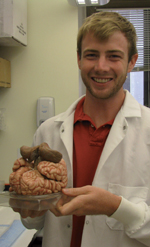|
|
|

|
Brain bank expands aging
research
|
by Dawn Brazell
Public Relations
Nicholas Gregory is used to getting funny looks when he tells people
his job title.
Explaining that he’s the brain donation coordinator of MUSC’s brain
bank can be a conversation stopper. But not for long.
Gregory is quick to tell them about the Carroll A. Campbell Jr.
Neuropathology Laboratory that just opened December 2009 and to
highlight the important brain tissue research being done—research
that’s a critical component in finding cures for such devastating
conditions as Alzheimer’s and Parkinson’s diseases and stroke.
Lotta Granholm, Ph.D., DDS, director of MUSC’s Center on Aging and
co-director of the Carroll A. Campbell Jr. Neuropathology Laboratory,
said the brain bank represents a big step forward in establishing a
neuropathology core at the university and in advancing research on
aging.
“The research we’ll be able to do with the brain bank—with the human
brains—is really exciting. We now have 13 brains, and we’re partnering
with other departments to get researchers interested in the human
tissue. The more interest that is raised creates more awareness and
leads to more brains donated.”
 Nicholas Gregory
holds a brain used
for resarch at the MUSC’s brain bank, which opened December 2009. The
bank now has 13 brains being used for research. Nicholas Gregory
holds a brain used
for resarch at the MUSC’s brain bank, which opened December 2009. The
bank now has 13 brains being used for research.
Gregory said the brain bank will make it easier for local researchers
to procure tissue without having to navigate the logistics of getting
it from other states. “We can look at the South Carolina population,
which in turn is the same people our doctors and clinicians are dealing
with, which is comparing apples to apples. We can lead research trials
here and come up with novel ideas and solutions for these problems.”
The laboratory does a postmortem diagnoses on the donated brains in
order to give closure to families, but also so the tissue can be
characterized and researchers can get the types of brain tissue they
need.
“The only way to accurately diagnose Alzheimer’s disease as well as
other neurological disorders is through a postmortem diagnosis,” he
said. “Also, the best way to study these diseases is to look at human
tissue, as mouse and rodent models do not accurately mimic the diseases
we see in humans.”
The state having its own brain bank will also help to solve the health
disparity problems that are unique to this state, which has a higher
incidence of Alzheimer’s disease, diabetes and stroke.
“We want to find out why this is. What is unique about our state that
is causing us to have these high rates of these diseases? The state has
a higher African-American population compared to the rest of the
country and this population is known to have a much higher risk of
developing Alzheimer’s disease and diabetes and is at greater risk for
stroke.”
According to the American Heart Association, South Carolina is sixth
highest in stroke related-deaths. In a recent report from the 2010
Alzheimer’s Disease Facts and Figures from the S.C. Alzheimer’s
Association, the state has the fourth highest incidence of deaths due
to Alzheimer’s disease.
Gregory said the brain bank offers an exciting resource to discover
more about the disparities between racial and ethnic groups. It also
allows research to move faster in discovering causes and treatments for
many different kinds of neurological diseases. The bank currently has
brains from people who have had Alzheimer’s and Parkinson’s diseases,
brain tumors and progressive supranuclear palsy.
“People are excited about this and see that it’s a great opportunity
for the state and for MUSC. It truly can do a lot of good here. We
already have a lot of clinical programs set up that we can collaborate
with. I think we can really make some progress.”
Gregory said the organ donation that people designate on their driver’s
license does not cover the brain. Brain donation requires a donor
registration form and also notification of the next-of-kin, who will be
required to sign a postmortem consent form after death. Anyone can
donate, except for people with certain infectious diseases such as AIDS
or Hepatitis.
Because people suffering from neurological disorders often understand
the need for research, the bank receives many of those types of
donations. It also needs “normal” or non-diseased brains, though, that
can be used as controls in studies, he said. The bank has 13 brains,
with it receiving one every other week. The goal is to increase it to
one a week.
Gregory said neuroscience is an exciting field, with the past decade
seeing an exponential growth in research. “As much as we’ve studied,
there’s still a long way to go.”
Having a local brain bank encourages more local people to make
donations, since research shows people are more likely to donate to a
state-supported program, he said.
“It’s a gift of hope and a way people can give back to their community.
Most people have the heart on their driver’s license. They are willing
to donate their organs to potentially save someone’s life. We believe
this is just as important.”
For more information or to print out a donor form, visit
http://academicdepartments.musc.edu/aging/research/Brain%20Bank/Homepage.htm.
Friday, Aug. 13,
2010
|
|
|



